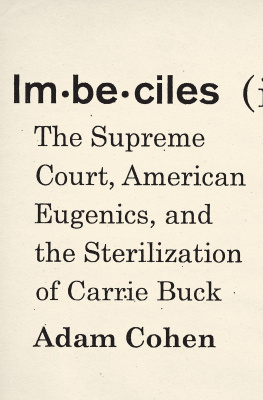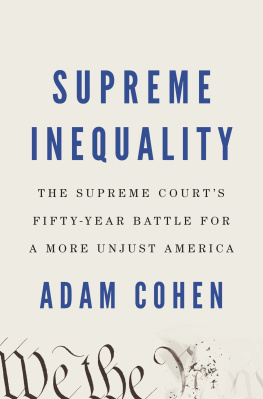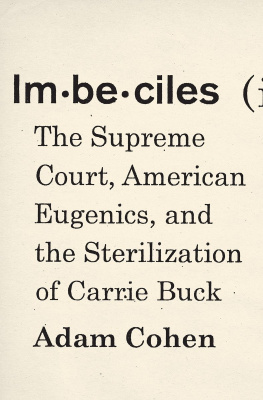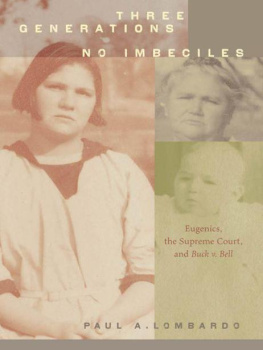Penguin supports copyright. Copyright fuels creativity, encourages diverse voices, promotes free speech, and creates a vibrant culture. Thank you for buying an authorized edition of this book and for complying with copyright laws by not reproducing, scanning, or distributing any part of it in any form without permission. You are supporting writers and allowing Penguin to continue to publish books for every reader.
Names: Cohen, Adam (Adam Seth), author.
Title: Imbeciles : the Supreme Court, American eugenics, and the sterilization of Carrie Buck / Adam Cohen.
Description: New York : Penguin Press, 2016.
Subjects: LCSH: Buck, Carrie, 19061983Trials, litigation, etc. | Involuntary sterilizationLaw and legislationUnited States. | EugenicsLaw and legislationUnited States. | Involuntary sterilizationLaw and legislationVirginia. | BISAC: HISTORY / United States / 20th Century. | LAW / Legal History. | LAW / Civil Rights.
Professing to be wise, they became fools...
Introduction
O n May 2, 2002, the governor of Virginia offered a sincere apology for his states participation in eugenics. In an effort to improve the genetic quality of its population, Virginia forcibly sterilized at least 7,450 unfit people between 1927 and 1979, more than any other state but California. was a shameful effort in which state government never should have been involved, the governor declared. We must remember the commonwealths past mistakes in order to prevent them from recurring.
Virginias apology came on the seventy-fifth anniversary of the United States Supreme Courts ruling in Buck v. Bell. In that dark legal landmark, the court upheld eugenic sterilization and allowed the state to sterilize Carrie Buck, a young woman wrongly labeled feebleminded. The court that decided Buck v. Bell included some of the most distinguished men in the annals of American law. The chief justice was William Howard Taft, who had served as president before ascending to the bench. Louis Brandeis, the towering progressive who had made his name as the peoples attorney, signed on to the majority opinion, as did Oliver Wendell Holmes Jr., widely considered to be one of the greatest legal mindsif not the greatestin American history.
It was the legendary Oliver Wendell Holmes who wrote the 1927 ruling, and he included in it one of the most brutal aphorisms in American jurisprudence. Holmes, the Harvard-educated scion of several of Bostons most distinguished families, was scornful of the poorly educated Carrie and her working-class mother. Based on scant information about the two Buck womenand about Carries daughter, who was a small child at the timehe famously declared: .
Holmess opinion for an 81 majority did not merely uphold Virginias sterilization law: it delivered a clarion call to Americans to identify those among them who should not be allowed to reproduceand to sterilize them in large numbers. The nation must sterilize those who of the State, Holmes insisted, to prevent our being swamped with incompetence. In words that could have been torn from the pages of a eugenics tract, he declared: It is better for all the world, if instead of waiting to execute degenerate offspring for crime, or to let them starve for their imbecility, society can prevent those who are manifestly unfit from continuing their kind.
T he United States in the 1920s was caught up in a mania: the drive to use newly discovered scientific laws of heredity to perfect humanity. Modern eugenics, which had emerged in England among followers of Charles Darwin, had crossed the Atlantic and become a full-fledged intellectual craze. The United States suddenly had a new enemy: bad germplasm, and those who carried it. The unfit, the eugenicists warned, threatened to bring down not only the nation but the whole human race.
Americas leading citizens led the charge to save humanity. John D. Rockefeller Jr., the worlds wealthiest man, funded scientific research into how what he called .
, like the upper-class New York advocate for the mentally ill who warned her fellow philanthropists that they put society at risk when their well-meaning charity helped men and women who are diseased and vicious to reproduce their kind.
In big cities and small towns, in national eugenic sermon contests organized on topics like Religion and EugenicsDoes the Church Have Any Responsibility for Improving the Human Stock?
Eugenics permeated the popular culture. Bestselling books explained the concept of race betterment to an eager public, and mass-market magazines urged their readers to do their part to breed superior human beings. , which filled theaters from coast to coast, showing the frightening consequences of allowing defective babies to live.
Conferences and public events were held to promote eugenics research and education. in Philadelphia, celebrating the Declaration of Independences 150th anniversary, the American Eugenics Society mounted an exhibit that explained the terrible threat with flashing lights. Every forty-eight seconds, the lights indicated, a mentally deficient person was born in the United States, while only every seven and a half minutes was a high grade person born, who would have [the] ability to do creative work and be fit for leadership.
Universities were quick to embrace eugenics and give it their intellectual imprimatur. , which asked the musical question: Men, which would you like to come and pour your tea. / Kisses that set your heart aflame, / Or love from a prophylactic dame?
behind the eugenics movement of the 1920s was, historians suggest, the collective fears of the Anglo-Saxon upper and middle classes about a changing America. Record levels of immigration were transforming the nations ethnic and religious makeup. And with increased industrialization and urbanization, community and family ties were fraying. These anxieties were being redirected and expressed in the form of fears about the unfit.
The eugenics movement offered two solutions: one for the threat from without and one for the danger from within. Its answer to the foreign threat was new immigration laws to limit the number of Italians, eastern European Jews, and other nonnorthern Europeans admitted to the country. the groups they wanted to exclude had inordinately high levels of physical and mental hereditary defects that were degrading Americas gene pool. They offered what purported to be scientific evidence, including intelligence tests claiming that between 40 and 50 percent of Jewish immigrants arriving at Ellis Island were mentally defective.
Congress held hearings at which eugenicists explained the biological deficiencies of various nationalities. Their arguments were well received by senators and representatives who overwhelmingly shared the eugenicists prejudices. in America perhaps the largest percentage of any country in the world of the pure, unadulterated Anglo-Saxon stock, Senator Ellison DuRant Smith of South Carolina declared, in support of new immigration policies. Acting on these eugenic arguments, Congress adopted the Immigration Act of 1924, which opened the door to more immigrants from northern Europe and shut it on southern and eastern Europeans.








